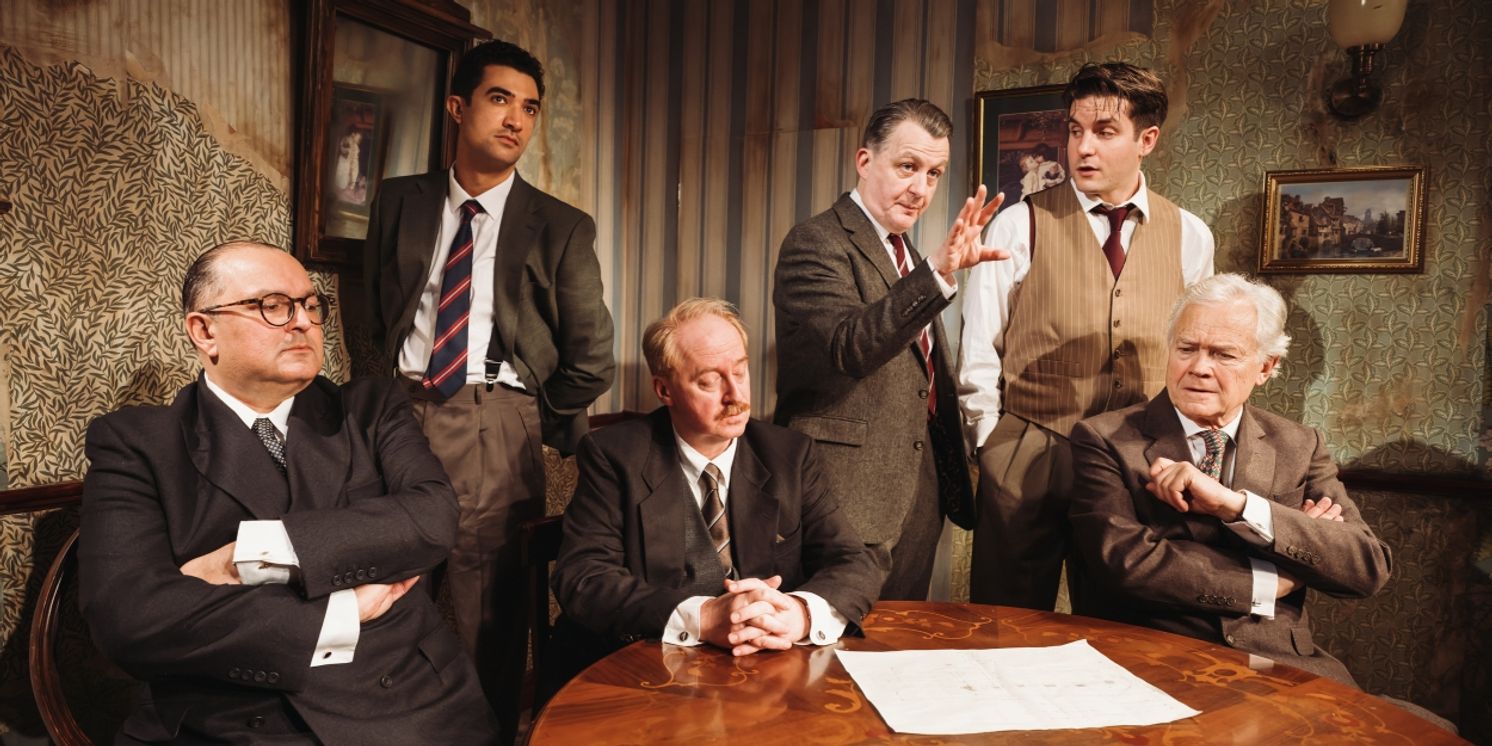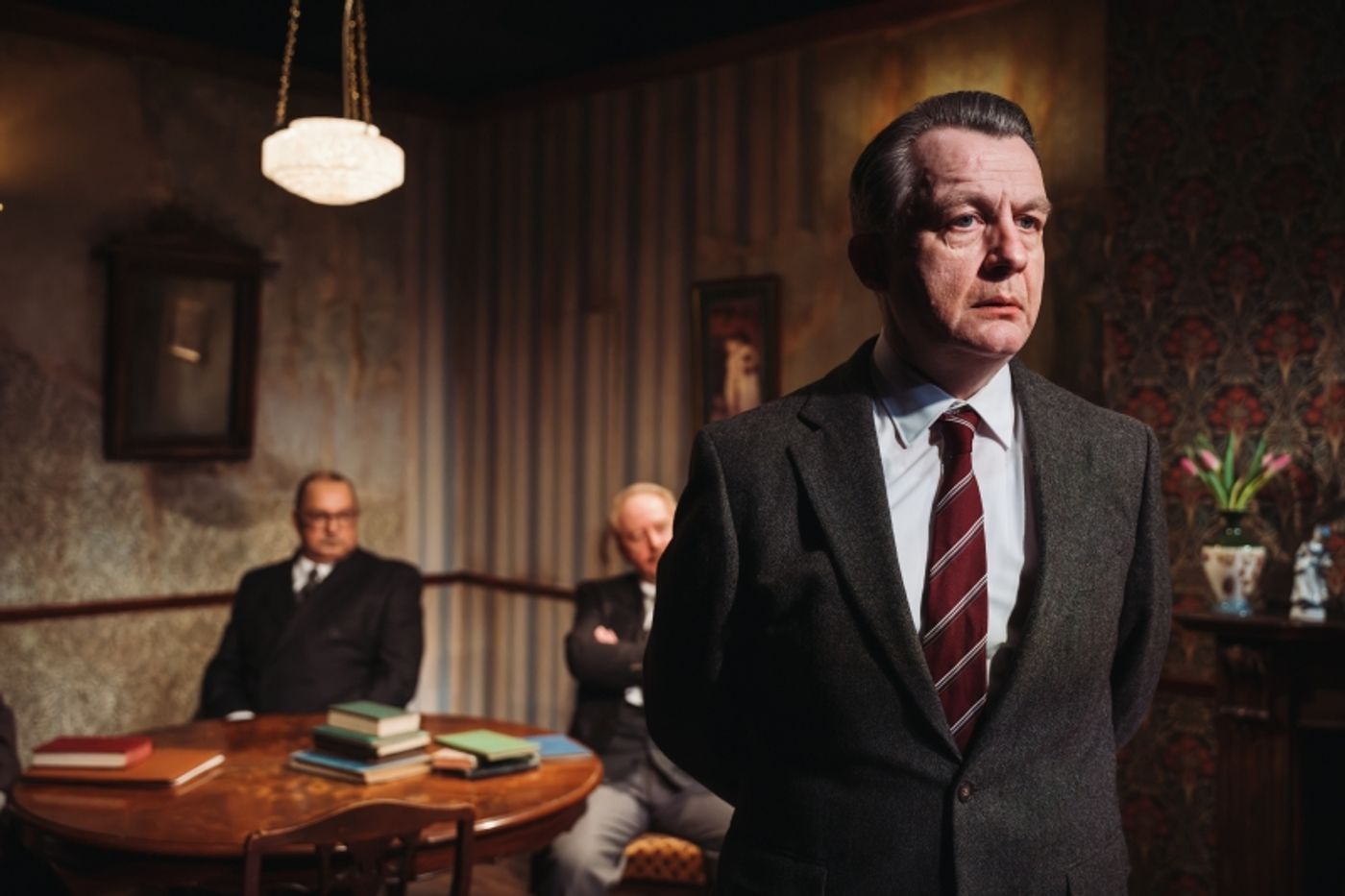Review: FARM HALL, Theatre Royal Haymarket
Old-school play focuses on Oppenheimer's counterparts from Germany

 It is not often that one sees so old-fashioned a play as Farm Hall, remarkably (in more ways than one) Katherine Moar’s first. One could imagine it fifty years ago as a somewhat high-minded Play For Today starring Alec Guinness and Derek Jacobi, probably from the pen of Alan Bennett or a pre-Copenhagen Michael Frayn. Sometimes to be innovative, all one has to do is dial the clock back a little.
It is not often that one sees so old-fashioned a play as Farm Hall, remarkably (in more ways than one) Katherine Moar’s first. One could imagine it fifty years ago as a somewhat high-minded Play For Today starring Alec Guinness and Derek Jacobi, probably from the pen of Alan Bennett or a pre-Copenhagen Michael Frayn. Sometimes to be innovative, all one has to do is dial the clock back a little.
Having started life at the tiny Jermyn Street Theatre, there’s a chance that the production could be lost in a major West End venue, but director, Stephen Unwin, ensures that these men circle each other literally as well as metaphorically, and, if there’s almost as much door-opening and door-closing on Ceci Calf faded drawing room set as one sees in Noises Off, at least the threat of a very static show is avoided.
Nevertheless, we can only expect a very wordy play and that’s what we get - after all, Moar has used the transcripts of British Intelligence’s clandestine recordings of the men's conversations during their involuntary stay in Cambridgeshire as a major source.

Like the world itself, the play splits into the time before Hiroshima and the time after.
The first half focuses on the characters of the interned scientists, the architects of the Reich’s half-hearted, ultimately unsuccessful, attempt to build an atom bomb. (Since the surprising success of Christopher Nolan’s Oppenheimer, many in the audience will be fully aware that The Manhattan Project was the work of a city, not just a few men with blackboards and test-tubes. The Nazis’ true comparator effort was the rocket works at Peenemünde, which produced the crack in the wall of my living room I'm looking at right now, and a ticket to Houston rather than Nuremburg for Wernher von Braun).
The professors do what men deprived of women and work always do - regress to the last time they were in such a situation, and behave like schoolboys. They bicker, they play board games and they reheat old enmities and resentments. They may not like Noel Coward’s Blithe Spirit, the play they are reluctantly rehearsing at one point, but they understand that they too are on a kind of stage, rooms bugged, movements observed.
Through a mercifully controlled quantum of exposition (which augurs well for Ms Hoar’s subsequent forays in playwrighting), we learn of their backstories and characters.
Alan Cox lends Heisenberg, the alpha male of alpha males, a quiet detachment, his commitment to a nationalism founded on German Romanticism rather than National Socialism, still guiding his thoughts. His counterpart is Diebner (Julius D’Silva bearing an uncanny resemblance to the old SA man) impulsive, unrepentant and socially awkward, the only man with no wife to be missing.
David Yelland’s von Laue is the eminence gris, prone to outbursts driven by his sense that he should have done more to resist the regime. Forbes Masson’s Hahn, the man who first split the atom, is a troubled presence, hiding dark thoughts behind the outward bonhomie. Daniel Boyd captures the aristocratic charm of von Weizsäcker (something he shared with von Braun) and Archie Backhouse gives his Bagge a grammar schoolboy’s chippiness in the face of gentle ribbing from his pal, the diplomat’s son.
It’s only after the revelation of the success of the Americans’ audacious gamble in Japan that the play gathers the weight in needs to succeed. The men are disbelieving, fearful and excited all at once, the terrible devastation nevertheless a vindication of their science. Diebner accuses Heisenberg of sabotaging his progress towards the Nazi Bomb with falsified calculations - Heisenberg, aware that his every utterance might be used against him by the British military or the German public, lets the ambiguity hang in the air. Hahn has a near-nervous breakdown and the others speculate on whether the news means the noose or not.
The play is compelling and somewhat heroic in its refusal to talk down to a general audience, but is nevertheless accessible. If the run-time of 105 minutes, including the interval, limits one or two of the men to caricatures rather than characters, the ideas come through strongly, issues of scientific ethics running alongside the tensions inherent in working under pressure and then living at close quarters.
Of course, we’ll never know if Heisenberg should be recognised as a genius not just for his physics, but also for playing a very long game that strung along the Reich with a doomed A-Bomb plan that elbowed out Diebner’s potentially successful route to destroying London, but that hardly matters now they are all dead, von Weizsäcker the last to go in 2007. Perhaps it’s right that this play leaves any answer to that question as uncertain.
Farm Hall at Theatre Royal Haymarket until 31 August
Photo Creditss: Alex Brenner
Reader Reviews
Videos

